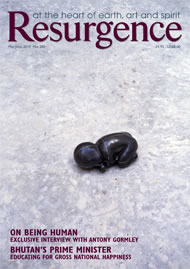“Show up, start anywhere, make mistakes,” advises Edward Espe Brown, author of the recently published Complete Tassajara Cookbook. The American master chef and Zen priest applies this mantra to both cooking and life: take what you have and dream up something tasty to do with it.
Brown, 64, helped shepherd vegetarian cooking from hippie to mainstream in the 1970s, introducing a generation to the joys of baking with the Tassajara Bread Book, dubbed ”the bible for bread baking” by The Washington Post. In celebration of its 40th anniversary, the bread book has been redesigned and reissued to coincide with the release of Brown’s new cookbook. A few of the bread book’s recipes have been lightly revised for this edition, but the primary change is the book’s more sophisticated look. An index, new introduction, and colour inserts featuring photos of recipes have been added.
A founder of Greens, San Francisco’s celebrated vegetarian restaurant, and co-author of The Greens Cookbook, Brown formerly headed the kitchen at Tassajara, a Buddhist meditation centre in California’s Carmel Valley and the new Complete Tassajara Cookbook combines and updates the best of Brown’s three other cookbooks, Tassajara Cooking, Tomato Blessings and Radish Teachings and The Tassajara Recipe Book.
Zen may be timeless, but times have changed. Thirty-five years ago Brown didn’t mention balsamic vinegar, goat’s cheese, sun-dried tomatoes or red bell peppers in Tassajara Cooking. Now, along with standards like potato-leek soup and marinated tofu, in the new book he uses a wider array of ingredients, offering recipes such as chili crêpes with goat cheese filling, and beet salad with pomegranate vinegar.
There’s no “right way” to prepare a dish, Brown insists. While the book teaches the basics, he encourages cooks to express themselves and rely on their own taste to decide what they like, and said it was a great compliment when a reader told him, “I used to need your cookbook; now I don’t. I do what I want.”
To help readers improvise, Brown presents 300 vegetarian recipes, with variations to suit different palates. He shows how to enhance a casserole of grains, beans or vegetables, with sautéed onion, garlic or bell peppers for flavour, or mushrooms or tomato for body and colour. He explains how to make a dish taste Italian with garlic, thyme, oregano, basil and Parmesan, or take it in an Asian direction with seasonings like ginger and dark sesame oil.
“You can see me in the way I cook,” he says. “Spicy, pungent, sweet and sour, I’m willing to be seen.” That’s why he agreed to be in the critically-acclaimed 2007 documentary, How to Cook Your Life, where viewers can watch his range of emotions from wry and delightful to what he describes as “angry, sad, moping, whining, fussing”.
Throughout The Complete Tassajara Cookbook, Brown sprinkles in poems and personal stories about food and Zen practice as palate cleansers and opportunities for reflection. Sometimes he writes exuberantly, as when he describes a platter of radishes, “brilliantly red and curvaceous, some elongated and white tipped, rootlets intact with topknots of green leaves sprouting from the opposite end. It was love at first sight.”
At other times he is philosophical. In the final lines of a poem at the beginning of the chapter on soups and stocks, he writes:
Appreciate this carrot, cabbage,
cucumber, and cress, this time
with the less than perfect.
The remarkable flavor you have
searched for is everywhere.
Let it come home to your heart.
“Zen is about getting in the kitchen and doing something with what you have,” says Brown, emphasising the value of using what comes into your life, whether it’s food or an unexpected experience. “There’s something to be said for appreciating organic produce. But let’s not waste what we have or value only what’s perfect.”
Based in Fairfax, California, Brown teaches cooking and meditation throughout the United States and in Europe. He leads regular sitting groups in a zendo, or meditation hall, attached to his home and will be teaching in Austria and Germany in June and July this year.
Wherever he’s teaching, Brown says, “My goal is not to create masterpieces or architectural projects on a plate. It’s simply to bring out the best in things.”






